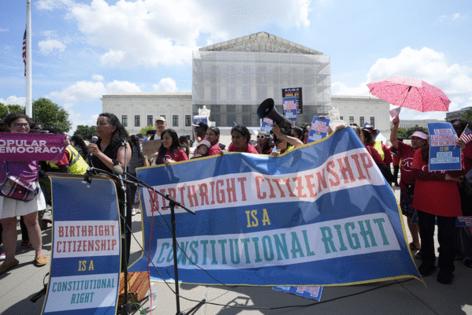New Supreme Court term could include birthright citizenship case
Published in News & Features
WASHINGTON — The Supreme Court’s term starting Monday could include major cases on President Donald Trump’s immigration policies, with the government now asking the justices to determine the lawfulness of his order to curtail birthright citizenship.
The executive order from Trump, signed on the first day of his second term as part of a tough-on-immigration approach, sought to deny citizenship to children born in the United States if their parents were not current citizens or permanent residents.
The Supreme Court last term heard oral arguments about how lower courts had blocked the administration from implementing the order. But the decision in June focused only on the process of how the order could be challenged and lower courts have once again blocked the policy.
The Justice Department now has asked the Supreme Court to take up the legality of the order as part of two of those challenges, “to enable the issue to be decided this Term.”
The term, which already has consequential cases on election, LGBT rights and other Trump actions, concludes at the end of June.
The Justice Department petition states that the birthright citizenship order “is a major policy of the current Administration” and “forms an integral part of the Administration’s broader effort to prevent illegal immigration.”
“Though these cases arise in a preliminary-injunction posture, further proceedings in the lower courts would have limited utility, given that the cases involve pure questions of law,” the petition states.
In July, the U.S. Court of Appeals for the 9th Circuit backed a universal injunction to stop implementation of the policy, finding the four states can challenge the policy and are likely to prevail on claims that the order contradicts the 14th Amendment and a federal law that uses similar language.
The plain language of the Citizenship Clause grants citizenship to “all persons born in the United States and subject to the jurisdiction thereof.”
And a federal judge in New Hampshire in July certified a nationwide class of those who would be denied citizenship under Trump’s order and blocked enforcement of the order.
The Trump order takes aim at the meaning of “subject to the jurisdiction” and directs federal government agencies not to issue citizenship documents to any children born where at least one parent is not a lawful permanent resident or citizen, originally starting in February.
The Justice Department in its petition argues that the Constitution does not “grant citizenship to the children of temporary visitors or illegal aliens” despite legal precedent to the contrary and the historic practice of an automatic citizenship to the children born to immigrants regardless of their parents’ legal status.
“The Clause was adopted to confer citizenship on the newly freed slaves and their children, not on the children of aliens temporarily visiting the United States or of illegal aliens,” the filing states.
Trump’s Jan. 20 order shortly after taking office is a significant break with historic practices and says the 14th Amendment has “never been interpreted to extend citizenship universally to everyone born within the United States.”
Other cases
The Supreme Court may also act soon on an emergency request the Trump administration filed in a case challenging the Department of Homeland Security’s mass revocation of Temporary Protected Status, which is parole given to certain migrants in the United States whose home countries are in turmoil.
Other cases on Trump immigration policies are percolating through lower courts and could reach the Supreme Court before the conclusion of the new term, such as a challenge to Trump’s invocation of the Alien Enemies Act for expedited removal of alleged gang members from the United States.
Last week, the full U.S. Court of Appeals for the 5th Circuit vacated a 2-1 panel decision that had determined an “invasion” as defined under the 1798 wartime law was not present for Trump to invoke it. The 5th Circuit is set to review the case en banc with the entirety of its members once a new briefing schedule is set.
The Supreme Court had previously issued decisions on Trump’s use of Alien Enemies Act from its emergency docket, allowing those detained to make claims in court before they are removed from the country. The Supreme Court also blocked the Trump administration from carrying out expedited removals under the Alien Enemies Act from the Bluebonnet Detention Center Texas on the basis that it had given migrants insufficient time to contest wrongful deportations.
And the U.S. Court of Appeals for the District of Columbia Circuit is considering a challenge to Trump’s order that limited eligibility for migrants to claim asylum in the United States. Arguments are set for the case on Nov. 3.
Last week, the Justice Department argued in a filing that the asylum order “has been an essential — indeed, an ‘indispensable’ — tool for securing the border and has produced the lowest levels of illegal border crossings in decades,” urging the appeals court to reverse a trial judge’s decision finding that Trump’s act was unlawful.
And last month, the U.S. Court of Appeals for the 1st Circuit overturned a lower court ruling that had blocked the Trump administration from categorically revoking a status allowing hundreds of thousands of migrants from Cuba, Haiti, Nicaragua and Venezuela to remain and work in the United States for up to two years under a Biden-era initiative.
The birthright citizenship case is Donald J. Trump, et al. v. Barbara, et al.
©2025 CQ-Roll Call, Inc., All Rights Reserved. Visit cqrollcall.com. Distributed by Tribune Content Agency, LLC.







Comments